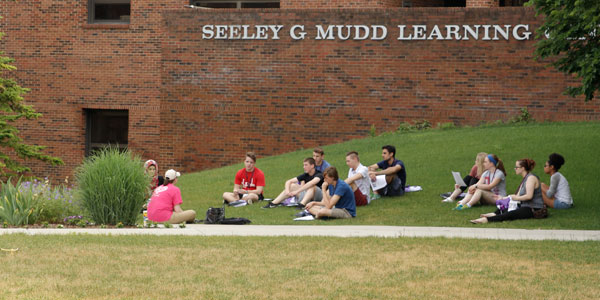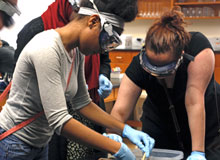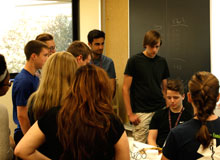Cardiology and College Credit at Albion’s First ‘Camp Med’
High schoolers from three states gain insight about the path toward a medical career
July 14, 2016
By Jake Weber

Camp Med students prepare to explore exercise physiology with kinesiology professor Heather Betz.
Summer camps have become a part of life for many American teens, an opportunity to hone skills and pursue interests. Albion College’s first “Camp Med,” held last month, went one step further, giving campers a quarter-unit of college credit in the bargain. (Most Albion College classes are one unit, and 32 units are required for graduation.) Camp Med “Cardiology 101” was three intensive days specifically designed for high school seniors and juniors interested in a medical career.
The 11 campers came from Michigan, Ohio and Indiana and were taught by members of Albion’s biology, chemistry, psychological science and kinesiology departments, along with Institute for Healthcare Professions (IHP) staff. Reminding the students that cardiology is a complex and multifaceted subject, the interdisciplinary experts took students through frog anatomy, human EKGs, medical ethics, exercise physiology and a number of other studies related to the topic.

Students perform a frog heart dissection.
While much of the subject matter was devoted to the career, Camp Med organizers made sure the students also started looking at the path toward that career. “The students came because they’re interested in medicine, but we also gave them a sense of the challenges they would face as they apply to college, take the MCAT and go to medical school,” said Barbara Keyes, IHP director and professor of psychological science. “A lot was about what to do now on the road to becoming a physician.”
“We were exceedingly pleased with how well this first Camp Med went,” said Brad Rabquer, assistant professor of biology and Camp Med organizer. He noted that four members of Albion’s faculty each volunteered to develop and teach a two-hour session. Having Albion’s camp taught exclusively by an enthusiastic group of college professors and professional staff made it a standout success.

“Faculty and staff here are eager to try new things and give new programs a chance,” said Rabquer. “Everyone here is an educator. We’re interested in working with young people.”
When asked what they liked best about Camp Med, the students’ diverse answers included nearly every aspect of the experience. One commented that the camp “helps you become more aware of what the pre-med path really takes you on.” Another mentioned that the “awesome people, super friendly and extremely smart, made me feel welcome.”
For another student, the topic itself was the best part,”the exposure to different aspects and environments and activities dealing with the heart, allowing you to see a single object (the heart) that is so crucial and see the intricate design of how it does its job.”
Rabquer noted that he and Keyes are already thinking about Camp Med 2017. “For me, it was exciting to work with high school students, to see what we could expect from them,” he concluded. “They did very well and it was a lot of fun.”